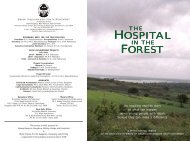Janaagraha - Resource Communications Pvt. Ltd
Janaagraha - Resource Communications Pvt. Ltd
Janaagraha - Resource Communications Pvt. Ltd
You also want an ePaper? Increase the reach of your titles
YUMPU automatically turns print PDFs into web optimized ePapers that Google loves.
J A N A AG R A H A C E N T R E F O R C I T I Z E N S H I P A N D D E M O C A R C Y<br />
C O R E P R O G R A M M E S<br />
18 19<br />
This was a terrific training<br />
program facilitated by Swati and<br />
Ramesh. Training sessions were<br />
interspersed with role plays, games<br />
and quizzes, making it very lively<br />
and extremely informative. We<br />
learned a lot and are better<br />
prepared to participate in the<br />
democratic institutions of our<br />
country.<br />
Dell India R&D Center was very<br />
fortunate to host the first Citizen<br />
Awareness Programme (CAP)<br />
session. The session would help not<br />
only in producing better citizens<br />
but also better Dell employees. I<br />
would highly recommend it to all<br />
the companies. Absolutely terrific<br />
programme, very inspiring indeed.<br />
—Vivek Mansingh,<br />
Country Manager & Director<br />
Dell India R&D Center<br />
our democracy, the CAP was created to give citizens the knowledge, motivation and<br />
tools necessary to participate in the political process. The interactive programme is<br />
conducted by trained facilitators with small groups of participants in corporate, college<br />
and community settings. Through multimedia presentations participants learn about<br />
the structure of the union, state and local governments, the infrastructure of service<br />
providers and the strengths and challenges of our democracy. Role-playing, team and<br />
individual exercises reinforce key concepts and provide opportunities for stimulating<br />
interaction between participants. The final module introduces tools and methods for<br />
community engagement that enable individuals to contribute to the quality of life in<br />
their own community. Participants become part of a growing network of committed<br />
citizens who feel a sense of ownership in their city and are empowered to shape the<br />
future of our democracy.<br />
The emerging voices of corporate India in demanding better infrastructure for<br />
economic growth, are not only building pressure on the system, but are also opening up<br />
space for more meaningful questions to be asked: what is the legitimacy of these voices,<br />
who should be making decisions in public institutions, how is this linked to urban<br />
politics, and what exactly does public governance mean These questions are not<br />
immediately apparent, but as more and more people start agitating, either in their<br />
minds or on the streets, about the state of urban affairs, this energy can perhaps be<br />
harnessed effectively. It could be directed towards constructive solutions that strengthen<br />
democratic processes. <strong>Janaagraha</strong> maintains a continuous dialogue with the business<br />
community on these issues in an effort to bring greater awareness and consensus on the<br />
deeper reforms that are required in how our public institutions function.<br />
Organisations in India are increasingly looking to participate meaningfully through<br />
their Corporate Social Responsibility activities. A greater emphasis has emerged on<br />
performance measurements along a triple bottom line of contribution to the companies'<br />
financial performance, towards society and to the environment. Companies are striving<br />
to include a substantial focus on issues of societal benefit and the role of the corporate<br />
citizen.<br />
The CAP provides a different approach in building leadership. Whether it is<br />
employees, youth or citizen leaders, they are exposed to issues and situations unlike<br />
anything they would experience in the course of their regular routine—working with<br />
heterogeneous groups, building teams and leadership, an exposure to processes of<br />
bargain consensus, working at the grassroots, understanding government machinery,<br />
and nurturing a genuine sense of ownership for their cities. Most importantly, it<br />
promotes a mindset of participating in decision-making, which can begin with their<br />
workplace, institution, or neighbourhood.<br />
A D V O C A C Y<br />
Creating the Momentum for Governance Reforms<br />
<strong>Janaagraha</strong>’s ideas, experiences, approach and work have evolved considerably from<br />
December 2001. Along with it, the understanding of the complexities of government<br />
structures in democracies around the world, has increased. The solutions we advocate<br />
reflect our understanding.<br />
Our advocacy efforts are focused on urban reforms for public governance and include:<br />
i. Institutionalising citizen participation through the concept of local Area<br />
Sabhas giving every registered voter in urban India a legitimate political space<br />
and role for participation.<br />
ii. Including a Law for Disclosure where local governments present quarterly<br />
performance statements.<br />
iii. Coordination between government agencies providing services to the<br />
municipalities. Additionally, aligning the currently multiple jurisdictional<br />
boundaries (administrative) with the political boundaries. This creates<br />
accountability for all goods and services at the local level.<br />
iv. Establishing regional structures for coordinated planning, within and across<br />
local governments. Making planning and budgeting concurrent and<br />
participatory. This is at both the micro level of the areas in each ward and the<br />
macro level of the metropolitan region.<br />
Based on the above, <strong>Janaagraha</strong> is proposing a framework for urban interventions to<br />
governments with specific action points in addressing the issues plaguing our cities and<br />
towns. We believe this framework provides sustainable reforms for how our public<br />
institutions practice governance. They go beyond the temporary band-aid solutions that<br />
many state and local governments are applying, and address the deeper malaise of poor<br />
governance. The following are in brief, the ten critical action items at the regional level,<br />
advocated in <strong>Janaagraha</strong>’s framework:<br />
1. Permanent Metropolitan Planning Committee with coordination powers<br />
a. Constitution with elected representatives and experts<br />
b. Master planning procedures and technical groups<br />
2. Completely revamped Municipality Law<br />
a. Direct election to mayor<br />
b. Three-tier structure of Municipality/Ward Committee/Area Sabha<br />
c. Formal citizen participation in municipal affairs<br />
d. Mandatory quarterly disclosure of performance<br />
A well-run city should be known not<br />
just by the quality of its infrastructure<br />
but the quality of its<br />
participation. The first will follow<br />
from the second, in a manner that is<br />
fair and equitable.















